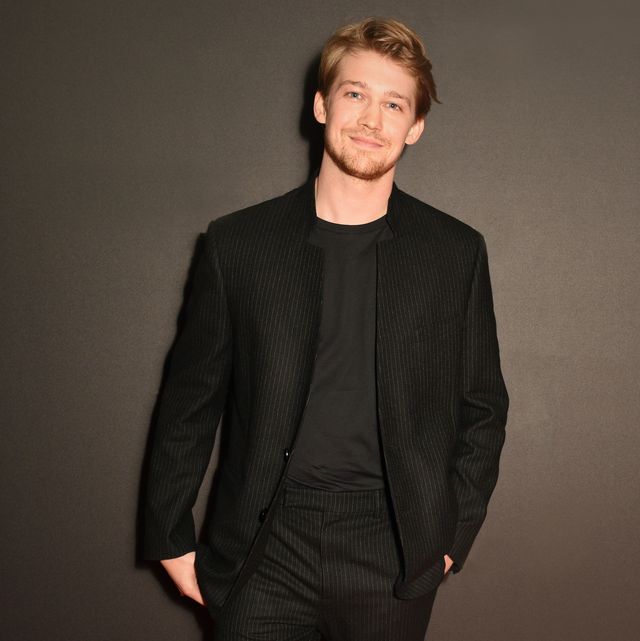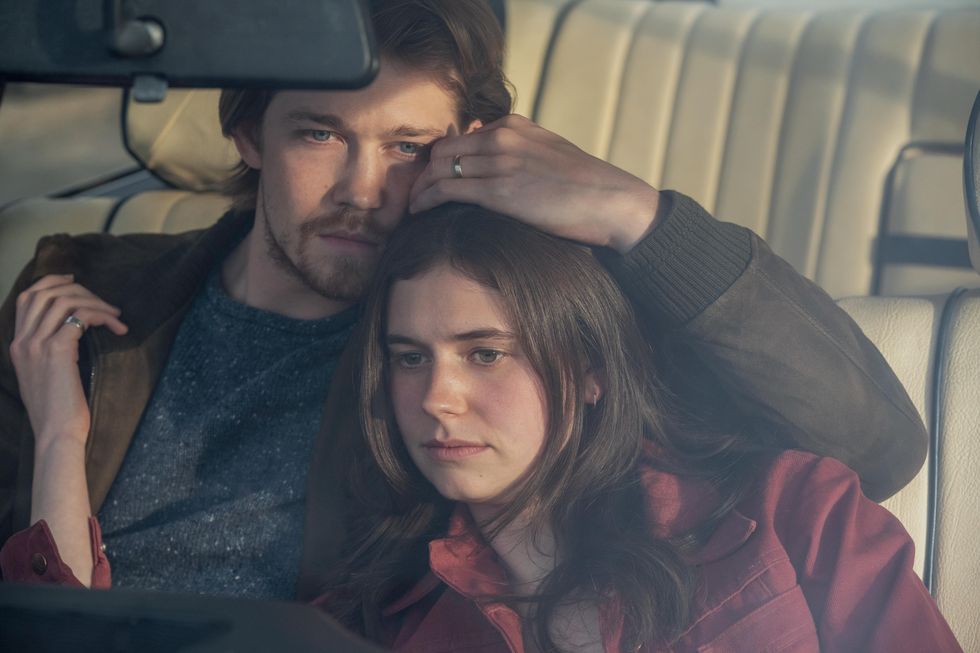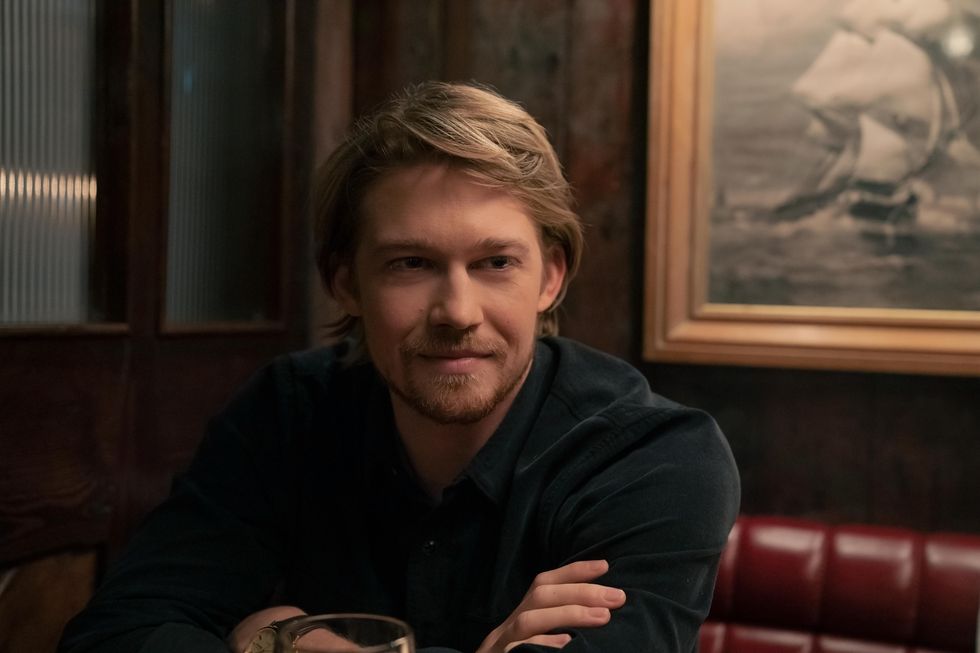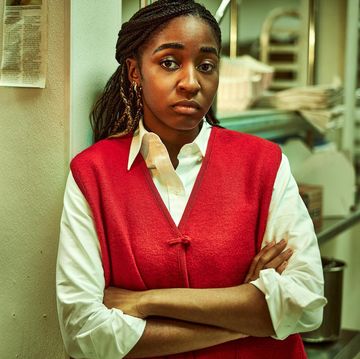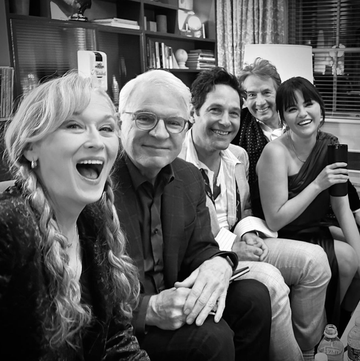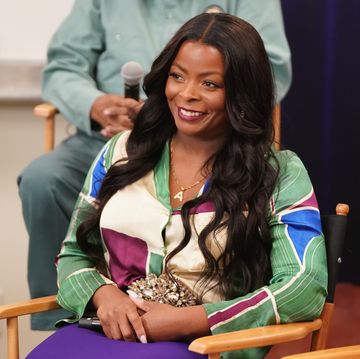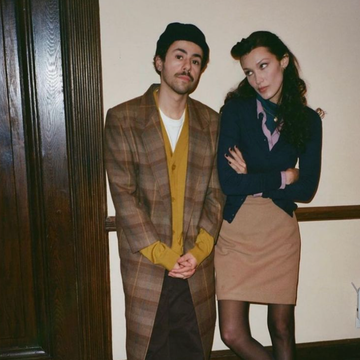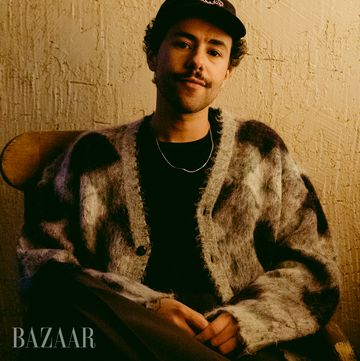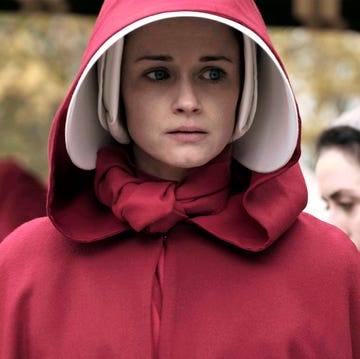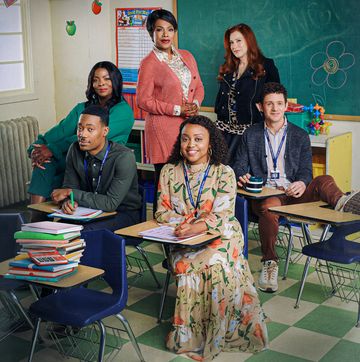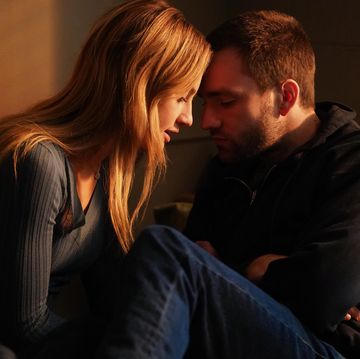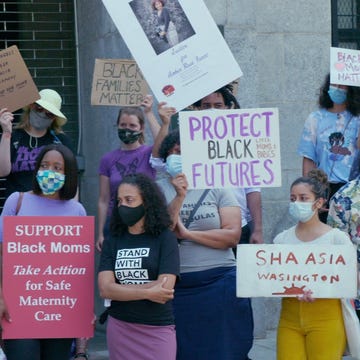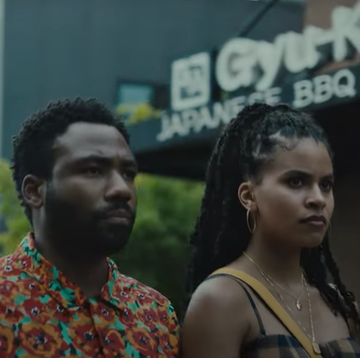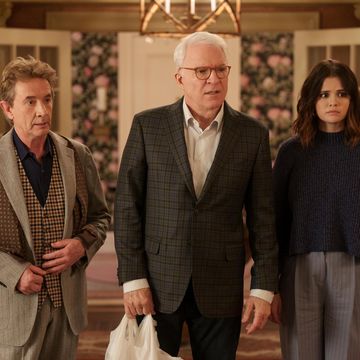“That’s not something people often ask me about,” admits Joe Alwyn. It’s a humid, sunny day in London, and I’ve just asked him about when people in the public eye should speak out about politics.
Specifically, we’re discussing so-called “conversion therapy” – a debunked practice which is still legal to perform on minors in 35 US states. The issue is close to Alwyn’s heart. His portrayal of tortured, closeted college athlete Henry Wallace in 2018’s Boy Erased, which followed a young gay man’s experience of conversion therapy in Tennessee, was his breakout film role. Closer to home, the UK government has just backtracked on its promise to completely outlaw the practice, so it’s topical. “I think it’s insane, it’s awful,” he says of the current situation. “It’s absolutely despicable. All of it needs to be banned.”
It’s both surprising and unsurprising that Alwyn isn’t often interrogated about his political views. Despite his impressive CV, which includes critically praised roles in Yorgos Lanthimos’s Oscar-winning The Favourite (2018) and Josie Rourke’s feminist retelling of Mary Queen of Scots (2018), he’s not a household name quite yet. But because of his girlfriend, who you might have heard of – a certain Taylor Swift – he is a topic of fascination in pop culture. (Speaking of politics, Swift credits him with helping her to go public with her political views in 2018, which caused youth voter registration to spike).
As Taylor Swift’s Boyfriend, Alwyn has clickbait articles and social media stan-fiction following his every move. But as Joe Alwyn The Actor, we're still getting to know him—at least for now.
This could change with his lead role in the Hulu adaptation of Conversations With Friends, the first novel by Irish literary sensation Sally Rooney. He plays Nick, a married actor suffering from depression who embarks on a messy love affair with Frances (Alison Oliver), an introverted student and writer. Frances is a self-described communist and feminist, with discussions of class and materialism woven into the story’s far more obvious sexual politics (and sexual tension).
The twelve-part series, which bears a resemblance to Hulu’s 2020 adaptation of Normal People (Rooney’s second novel), seems destined to make Alwyn much more famous. This is exactly what happened to Normal People stars Daisy Edgar-Jones and Paul Mescal, who have since launched successful film careers. Mescal even became a style icon, of sorts, for his penchant for wearing short shorts. Since he got the role, Alwyn and Mescal have been in a WhatsApp chat together – a conversation with friends, you might say. It’s called The Tortured Man Club, a nod to their characters Nick and Connell.
I wonder if Alwyn has realized that the proverbial scales which balance his work and personal fame could be about to become much more evenly weighted? “I find it quite hard to jump ahead and think about what might happen,” he says. “Working on this show, which is so highly anticipated by so many people, we all had to just keep our heads down and not think about that.”
Alwyn’s ascension has been forecast for years. “The unstoppable rise of Mr Joe Alwyn,” said Mr Porter in 2019. “Joe Alwyn is about to be very famous (and there's nothing he can do about it)”, prophesied GQ just last week. The list goes on. It seems understandable that he wouldn’t be fazed by his impending fame. I’d imagine being in a relationship with one of the most famous people in the world must take some of the edge off. He’s also worked with some very well-known people, like Kristen Stewart in Billy Lynn’s Long Halftime Walk (2016). His friend Emma Stone, who he worked with in The Favourite, reportedly introduced him to Swift (though this has never been confirmed). Alwyn’s current co-star Jemima Kirke also has experience of starring in heavily discoursed TV shows. (She was cast in HBO’s Girls by her childhood friend Lena Dunham and more recently she joined Netflix’s Sex Education). Dunham is a close friend of Swift’s too, so Kirke and Alwyn were “friends of friends”, but they only met a week before filming, when they shared a drink together. “She’s a lot of fun to be around, she likes a good time and she’s fierce in the best way,” he says with a knowing smile, as if there’s a story there.
Celebrity tends to mean something different to Alwyn’s generation, who came of age when becoming “famous for being famous” was the norm. Like me, he grew up in a British media environment where contestants on shows like Big Brother and Pop Idol (Simon Cowell’s British predecessor to American Idol) were being declared “stars” overnight by the tabloids, only to disappear months later. Survey after survey would show that most young people wanted to be “famous” when they grew up, regardless of what it was for. Fame was no longer about doing something, but being someone.
As a teenager, Alwyn began secretly googling “drama school” on his computer. After graduating with a degree in English literature in 2012, he applied to four drama schools and was eventually accepted to one in London. His “big dream” was a play at London’s iconic Young Vic theater – one he hasn’t fulfilled yet, but only because he’s been too busy doing film and TV. In 2015, he left drama school four months early, after being cast in a lead role by Oscar-winning director Ang Lee. He tells me that when he envisaged his future career as an actor, fame and money weren’t big factors: “I don’t think you should equate success to money. It’s dangerous to commodify it too much.”
I ask Alwyn why he isn’t very active on social media. He posts on Instagram occasionally, where he has 875,000 followers. But by his own admission he “abandoned” Twitter some time ago. “I just think social media is weird,” he says. “There are times it can be useful, for sure, but I think it can also be a pretty corrosive space and not great for mental health. And if I can keep that at arm's length, then I'm probably slightly saner for myself.” (He says he has no secret burner accounts, so abandon your searches, Swifties).
There are several points where our conversation gets very “meta”. Nick, his character in Conversations With Friends, is an actor in his early thirties whose partner is a successful wordsmith. Nick occupies a level of fame where people can remember watching him, but he’s not taking home Oscars quite yet. (Does that ring any bells?) Alwyn does note the obvious similarities between them on paper. “I tried not to get too lost in the meta-ness of ‘I’m an actor playing an actor who you can see acting’,” he laughs.
Shooting for the show lasted five months between Ireland, the UK and the US. Alwyn recalls choreographing the many nude scenes with renowned intimacy coach Ita O'Brien, who also worked on Normal People. O’Brien would roll around the floor and show the actors what to do, banishing any tension from the room. By the end of filming, Alwyn could feel Nick inhabiting him more than normal. I ask about Gaga-style “method acting”, which seems to be all the rage right now. He responds that Olivia Colman’s ability to “turn it on and off instantly,” which he witnessed up-close filming The Favourite, is more his thing.
There were also reports that Alwyn “got buff” for the role. Nick is described in the book as muscley, so was there pumping iron involved? Alwyn did ask director Lenny Abrahamson about this initially, but was reassured he didn’t need to start “inhaling protein shakes”. Another negotiation between the pair was Nick’s accent. Having been given the option to stick with English, they opted for a soft, slightly anglicized Dublin accent. As a fan of Rooney's novels, I’m relieved about this choice. Irishness is deeply embedded within her stories. With Bobbi (Sasha Lane) now an American (a deviation from the book) and Melissa (Kirke) being British, the Irish accents of Nick and Frances somehow reinforce the intimacy and secrecy of their affair.
What does Alwyn like the most about Rooney's novels? “Her characters always feel solidly real and complex, they’re flawed but witty and fragile too,” he replies. “In her books, it's the small moments that matter a huge amount, that’s why everyone loves her writing.” And what does Swift think of them? “She’s a big fan of Sally’s writing and loved the book, like I did, so she was equally thrilled when I got the part,” he says. I confess that I was a bit nervous to ask him that, given that he’s notoriously private about their relationship. This seems to surprise him. “Like anyone, we talk about work and life and everything, that’s part of being with someone,” he says, before adding: “And it’s a great part of being with someone.”
The couple’s involvement in each other’s work goes beyond mere discussions. Not only was Alwyn the inspiration for Swift’s much-meme’d 2019 song ‘London Boy’, but he is credited as a co-writer and producer on several songs from her 2020 album Folklore, which won Album of the Year at the 63rd Grammy Awards, plus the 2021 follow-up Evermore. Tracks he’s credited on, like ‘Illicit Affairs’, which details the slow decline of infidelity, and the heartbreaking ‘This Is Me Trying’, would not have seemed out of place on the Conversations With Friends soundtrack. The National’s Aaron Dessner co-produced several tracks on Folklore alongside him. Alwyn tells me he’s a big fan of The National and the band were even on the “Nick” playlist Rooney shared with him prior to filming. (She does this for all her characters, apparently). Suddenly, things feel very meta again.
Alwyn is characteristically modest about his songwriting. His grandfather William was a composer and he was in a band at school (Anger Management, they mostly played metal covers), but says his involvement was a happy accident in COVID lockdown between London and LA. The pair wrote songs together out of boredom after he hummed the opening melody of the epically cinematic ‘Exile’, the album’s second single, in the kitchen. He says the couple have no plans to do more songwriting together, but he seems to look back at the experience fondly. I joke that my COVID lockdown consisted of sourdough and zero Grammy Award-winning hits, to which he responded: “Sourdough is delicious, also!”, as if to reassure me.
This is the thing about Alwyn. I had read just about every interview with him before we spoke, many of which described him as variations of guarded or mysterious. But with the exception of Britain’s Oxbridge-educated elite, it’s not hugely common to hear English people confidently shouting their professional or personal achievements from the rooftops. To me – someone who doesn’t live far from Alwyn in London – his demeanor seems typical of a normal English guy. (Or dare I say it, a London Boy?).
Readings of Alwyn as a closed book could be down to him being interviewed by people who aren’t used to encountering his English sensibility. Or perhaps it’s that, by his own admission, he feels much more relaxed in interviews now. (In 2019, he asked one interviewer if he is “allowed” to say he likes football). Really, it’s probably got more to do with the fact that he’s been pretty open about not wanting to talk about his relationship in the press. In our discussion, I could feel myself getting a little tense whenever we approached a Taylor-adjacent question, which in every case turned out to be completely unnecessary.
The week before we spoke, Alwyn went viral for giving a classic “non answer” about whether or not he and Swift are engaged. He basically said that, even if they were, he wouldn’t say. This was transformed into a million articles about him “finally addressing” the rumors. It certainly seems to vindicate the pair’s decision to use a pseudonym (William Bowery) for Alwyn’s credits on Folklore, before revealing his true identity some months later. He tells me this was always the plan. “The idea was that for the first few months, we wanted people to listen to the music initially rather than focus on the fact we wrote it together,” he says. But fans began to intensely speculate about Bowery. Knowing it would surely lead to more questions about their relationship, the pair revealed the collaboration.
Towards the end of our conversation, I ask Alwyn about another answer he often gives in interviews, when he’s asked about personal stuff. I’m paraphrasing, but it’s essentially: “People on the street wouldn’t tell strangers about their personal lives, so why should I?” Surely, I say, no matter how normal he might come across and feel himself, Alwyn must know he’s not a random guy on the street, and that making art publicly might prompt questions of a personal nature. (Art is personal, after all). Is this just a way of not answering, or an actual belief he holds?
“I completely expect people to ask those questions, if I’m putting work into the world, of course people are going to ask about that,” he says, definitively. “I can understand that those questions would be asked, but I don’t see why these questions should always be answered.” His response couldn’t be clearer. And it’s pretty difficult to argue with.
